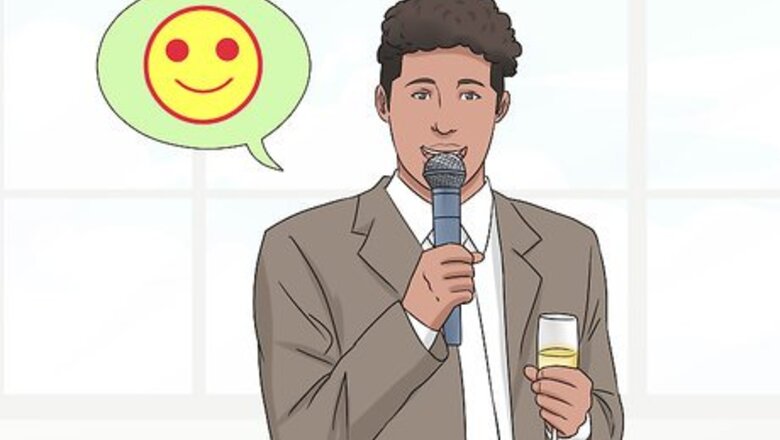
views
Ending a Funny Speech
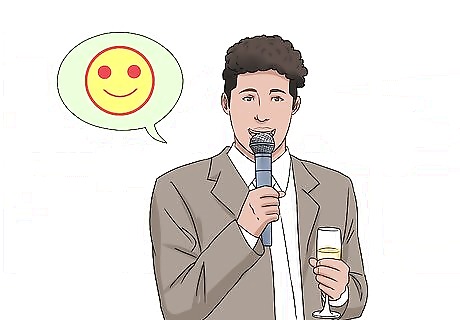
Use family-friendly language in your ending. Weddings typically include guests of all ages. Even if kids aren’t in attendance for your speech, the couple’s parents and grandparents probably are. Leave explicit language and dirty jokes at home.
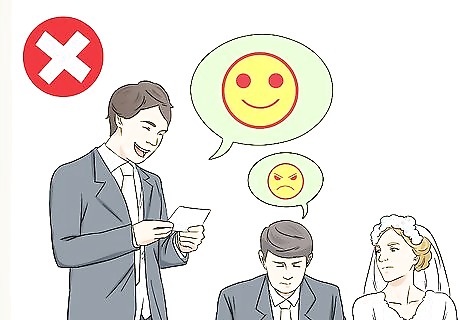
Avoid using humor to criticizes others. A bit of harmless fun is okay, such as laughing at the groom’s cooking or dancing. If your speech goes too far, however, it leaves a sour note the rest of the night. Avoid using your ending to criticize or humiliate others. For example, the person’s boss may be present, so you don’t want to say, “I wish you well, and hopefully Greg works harder for his bride than he does for his boss.”
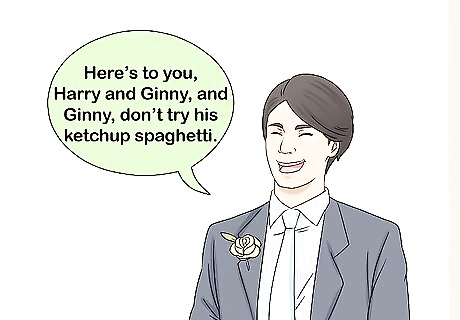
Reference the rest of your speech. The best ending joke calls back to the rest of your speech in order to illustrate your friend's personality. Focus all of your jokes around a harmless subject, such as your friend’s questionable cooking. Then, end the speech by mixing well-wishes with one last joke. For example, say, “Here’s to you, Harry and Ginny, and Ginny, don’t try his ketchup spaghetti.”
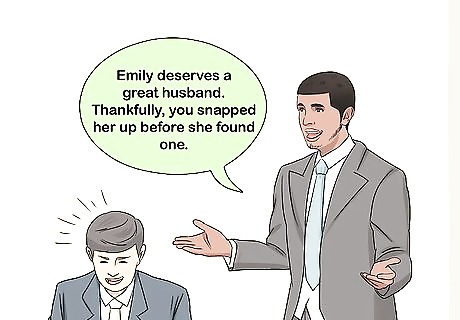
Tell a joke that is short and to the point. If you choose to end on a joke, make sure it is easy to understand. It has to be quick and punchy. Read the joke over a few times after you write it and say it out loud a few times. If it feels too long, it won’t work well as an ending. For example, you can say, “Emily deserves a great husband. Thankfully, you snapped her up before she found one.” For a funny ending, you might say something like, “To the two things that make a great marriage, a good sense of humor and selective hearing. To Peter and Paul.” If you aren’t comfortable making a joke, leave the humor out. A sincere, upbeat ending sounds better than a forced joke.
Finding with a Heartfelt Sendoff

Start the ending by calling for a toast. The toast indicates to the audience that your speech is reaching its conclusion. The easiest way to do this is to simply ask the audience to join you in saluting the happy couple. For instance, say something like, “Please join me in raising a glass to the happy couple.” If you don’t dedicate a separate line to the toast, clearly indicate that the end of your speech is coming. For instance, you might say the couple’s names, then stop and pick up your glass.
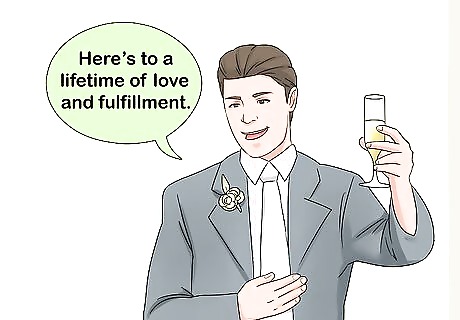
Wish for the couple’s long-term happiness. Finish your conclusion by offering your support and well-wishes for the new marriage. Keep this part short and simple as well. Speak from the heart and always be positive about the union.. For a serious ending, say something like, “Here’s to a lifetime of love and fulfillment.” EXPERT TIP Rachel Weinshanker Rachel Weinshanker Certified Event & Wedding Planner Rachel Weinshanker is a Certified Event and Wedding Planner and the Owner of San Diego Life Events, an award-winning wedding and event planning business based in San Diego, California. Rachel has over eight years of event planning experience, and her work has been featured in many notable publications. San Diego Life Events has been awarded the Wedding Wire Couple's Choice Award in 2018, 2019, and 2020. Rachel is a graduate from San Diego State University. Rachel Weinshanker Rachel Weinshanker Certified Event & Wedding Planner Our Expert Agrees: When you're writing a best man's speech, keep it short and sweet, and even if your speech includes lighthearted jokes at the couple, end it on a positive note. That will leave the crowd feeling inspired and happy to be a part of the occasion.
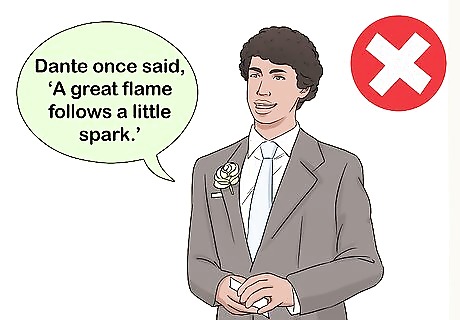
Avoid ending with a famous quote. Anytime you use a quote, you have to stop and explain who or where it is from. Quotes interrupt your ending’s flow and often drag on a little too long. You are better off articulating your thoughts in your own words. For example, you may think of saying, “Dante once said, ‘A great flame follows a little spark.’” If you have to have the quote, use it in the beginning of your speech.
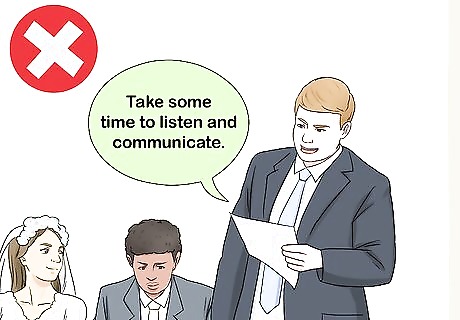
Avoid ending with marriage advice. No matter how insightful or comedic you think it sounds, it usually detracts from your ending. If you aren’t married, you will have a tough time sounding knowledgeable. Even if you are married, the couple will most likely hear similar advice from parents and relatives. For example, avoid saying, “Take some time to listen and communicate, and I know we’ll be here someday to celebrate your 50th anniversary.”
Wrapping up with an Anecdote

Focus on the marriage instead of past relationships. This wedding is a special day for the newlywed couple, so focus on wishing them well in the ending. Nothing will ruin the tone of your closing remarks quite like an offhand reference the audience doesn’t want to hear. Bid them a happy, successful marriage. For example, say, “I wish my best friend and his bride a life filled with happiness, adventure, and great memories.”
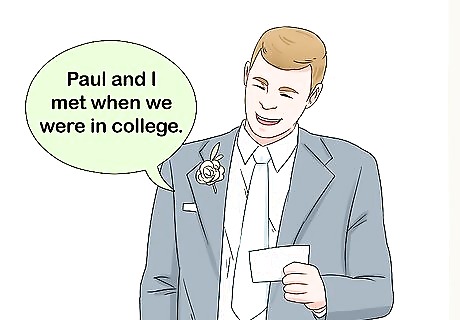
End the story in a family-friendly way. Leave the strong language or questionable content at home. Also, avoid being excessively critical. It’s okay to tell harmless stories, such as how you met your friend or a few of their actions. Tell the story in the rest of your speech, then bring it to a conclusion in your ending. Good subject matter involves things like your friend’s hobbies, dancing, cooking, or experiences.
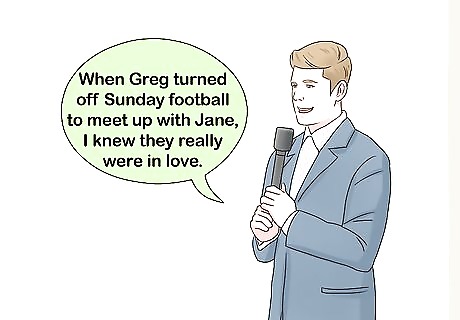
Explain how your story relates to the marriage. The anecdote should provide insight on why this marriage is special. If you can close your speech on this point, it sounds more powerful. Reference your anecdote’s theme again and use it to wish the new couple well. For instance, say, “When Greg turned off Sunday football to meet up with Jane, I knew they really were in love.”
Delivering the Speech
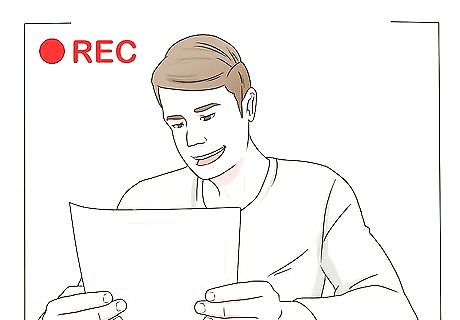
Record yourself reading the entire speech out loud. Reading it in front of a mirror or test audience helps, but you should listen to yourself speak. Test the ending to see if it fits naturally with the rest of your speech. It should express your blessings for the new couple succinctly but clearly. Also note any times you have trouble speaking the lines. As the best man, you have to sound enthusiastic. Adjust your speaking style as well as your speech.
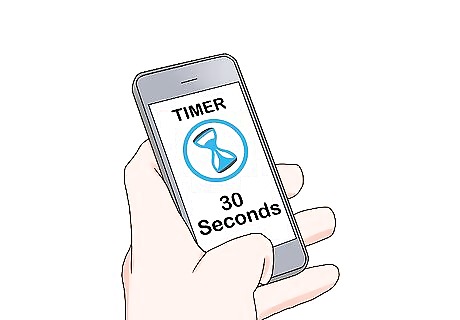
Time the speech as you read it. Use a timer to monitor how long the ending runs on. The speech overall should only take between 45 seconds and 5 minutes, therefore your ending should take up 30 seconds or less. Many best man speeches run into trouble by rambling. Keep your ending short and to the point.
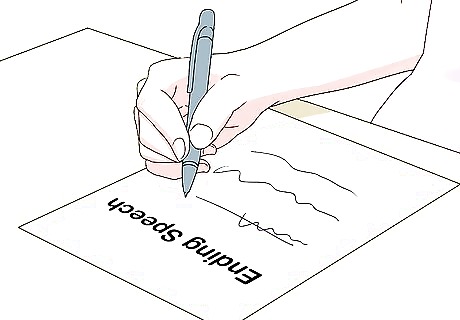
Edit your speech for clarity and brevity. Go back to the ending and refine it as needed to make it effective. Adjust any spots that sound awkward, difficult to recite, or otherwise don’t fit in with the rest of your speech. Shorten it if it seems to drag on too long at the end. For a great ending, the entire speech has to move quickly and lead into the final line. That’s why it’s important to rehearse your speech as a whole.

Memorize your speech. You should have your speech mostly memorized before you attend the event. You don’t have to know it word-for-word, but you should be able to repeat the important points convincingly and in order. Make sure you rehearse it so it sounds natural. You can always print or write out speech notes on notecards. Keep these with you in case you get stuck during the speech. Avoid reading from a script. The best speeches look and sounds natural.

Avoid drinking too much. If you’ve ever seen a speech from someone under the influence, you know it usually doesn’t go well. If you forget your lines or speak off the cuff, you may lose the audience before you reach the ending. Find other ways to handle nervousness.
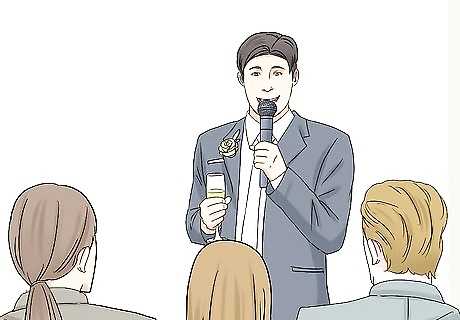
Make eye contact with your audience. Make your ending powerful by engaging the audience. Use a voice loud enough to reach the back of the room. Glance around the room until you reach the toast. Once you get there, turn to the couple to speak directly to them. Be confident in the fact that you learned and practiced the ending. As long as you aren’t offensive, you will usually get a positive reaction. You don’t have to look directly at your audience. Glance around the room, focusing on different foreheads. No one will know the difference.
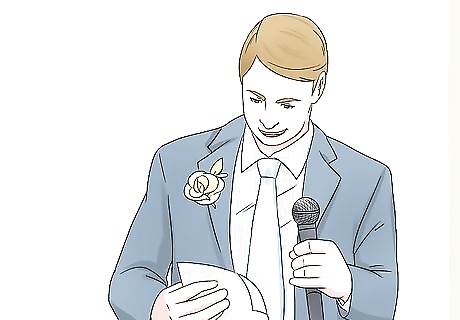
Stay on script when reading your ending. Stick to what you rehearsed. A few light observations about the event are fine, but they are better used in the beginning of your speech. Focus instead on expressing your thoughts in a few short, powerful lines.










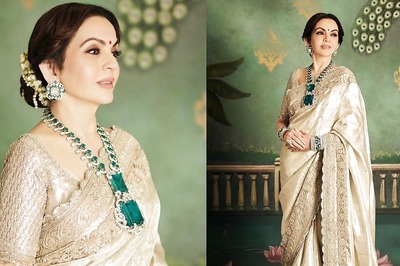



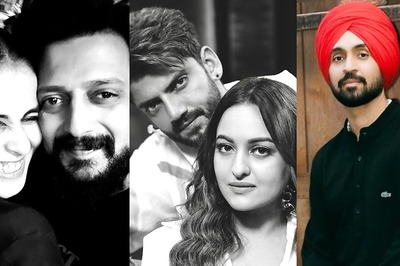


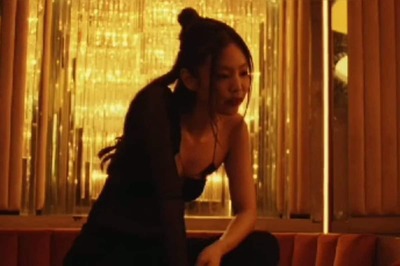


Comments
0 comment